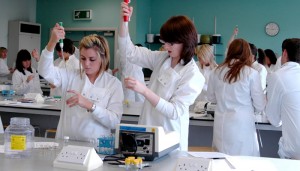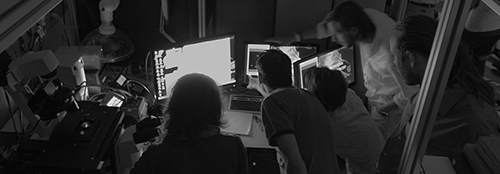Education
The section of Molecular Cytology is involved in many different university courses at various levels. In addition the van Leeuwenhoek Centre for Advanced Microscopy (LCAM) organizes courses for users interested in applying fluorescence microscopy in their own research.
For a complete description of the courses below and/or organised within the LCAM follow the links or visit www.microscopycourse.nl.
UvA Bachelor courses:
Bio-organische chemie, Biochemie & Celbiologie <onderdeel van Bachelor Bio-medische wetenschappen, Bachelor Biologie & Bachelor Psychobiologie>
Het begrijpen van belangrijke processen en structuren in de cel op moleculair niveau, uitgaande van chemische en biologische principes. Voorbeelden van dergelijke processen zijn celdeling, de vermenigvuldiging van het erfelijke materiaal, eiwittransport, signaaltransductie, energievoorziening en metabolisme. De volgende praktische vaardigheden worden geleerd: Steriel werken, kweken van bacteriën, cel preparaten maken, gebruik van microscopen, beeldanalyse, analytisch pipetteren, eiwitzuivering, enzym kinetiek.
Cellulaire Oncologie <onderdeel van Bachelor Bio-medische wetenschappen>
Het imagen van levende cellen heeft een revolutie in de celbiologie veroorzaakt en is cruciaal voor het begrijpen van kanker en de daaraan gerelateerde therapeutische strategieën. In de cursus cellulaire oncologie wordt je ingeleid in de geheimen van de levende cel microscopie geïllustreerd aan het klinisch uiterst relevante probleem kanker. De cursus is half theoretisch en half praktisch en heeft tot doel de student in te voeren in de moderne moleculaire celbiologie van dynamische structuren in levende cellen in relatie tot oncologie. Het belangrijkste leerdoel is de koppeling tussen theorie en onderzoekspraktijk.
Bachelor miniscriptie <onderdeel van Bachelor Bio-medische wetenschappen>
De student schrijft een literatuurverslag in het Engels naar aanleiding van een grondige literatuurstudie over een actueel onderwerp naar keuze op het gebied van een van de leerstoelgroepen van de verschillende onderzoeksinstituten.
Frontiers in Medical Biology I <onderdeel van Bachelor Bio-medische wetenschappen>
Frontiers in Medical Biology I is een cursus waarbij studenten hedendaagse gezondsheids issues (kanker, veroudering en voedsel & gezondheid) bestuderen vanuit verschillende invalshoeken, gebaseerd op een solide kennis van de ontwikkelingsbiologie.
Bachelorproject Biomedische wetenschappen <onderdeel van Bachelor Bio-medische wetenschappen>
Aan het eind van de bachelor opleiding gaat de student de opgedane kennis en vaardigheden toepassen in de praktijk. Tijdens een 12 weken durende stage formuleren de studenten onderzoeksvragen, voeren zelfstandig een kort onderzoek uit, schrijven een wetenschappelijk artikel en presenteren en bediscussieren van de onderzoeksgegevens in het Engels met behulp van powerpoint.
UvA Master courses:
Master track “Cell Biology and Advanced Microscopy” in the UvA Master Biomedical Sciences
Cell Biology is the discipline that studies the function of cells in the complexity of tissues and organs in the human body in order to understand mechanisms of disease. The tremendous revolutions in the past decade in light microscopy and biosensors to visualize processes in cells have changed cell biology completely. The track Cell Biology and Advanced Microscopy is a collaborative effort by the University of Amsterdam (UvA) the Academic Medical Centre (AMC), the Netherlands Cancer Institute (NKI) and the Leeuwenhoek Center for Advanced Microscopy.
Advanced Microscopy <part of Master Biomolecular Sciences-track Cell Biology and Advanced Microscopy>
The general aim of this course is to get hands-on experience and theoretical background in performing state-of-the-art advanced (light) microscopy applied to cell biology. This course provides training in the diverse modes of advanced fluorescence microscopyat the three laboratories of the van Leeuwenhoek Centre for Advanced Microscopy.
Clinical Cell Biology <part of Master Biomolecular Sciences-track Cell Biology and Advanced Microscopy>
Clinical Cell Biology is the discipline that studies the function of cells (in the context of tissues and organs in the human body) in order to understand mechanisms of disease. The major aim of this master course is to gain understanding of fundamental cell biological research in relation to human disease. This understanding comprises a. cell biology in the context of the healthy and diseased human body; b. the cellular basis of major human diseases such as neurodegenerative diseases, infection by viruses, bacteria and parasites, and cancer such as leukemia; c. diagnostics such as cytopathology and prenatal screening.
Molecular Stucture in Biology <part of Master Biomolecular Sciences, Master Chemistry, Master Life Sciences/Systems Biology>
The aim of the course is to make the participants acquainted with the background and principles of current methods for the analysis of biomolecular structure and with procedures to analyse functional dynamics in those structures. The emphasis will be on the type of information and insight that can be obtained from the various methods available that could serve as input in the cycle with computational modelling for the systems biology approach. Further, the students will learn to apply the knowledge obtained to evaluate current research results in life sciences.
Current Topics in Developmental Biology <part of Master Biological and Biomedical Sciences >
In this course, students will learn to critically read and discuss recent literature in the field of embryonic development, tissue morphogenesis and regeneration. You will become familiar with current concepts and challenges in these fields and state of the art experimental techniques used to address these issues. Some of these topics will be discussed in the form of a seminar by guest speakers.
Biomedical Systems Biology <part of Master Medical Biochemistry>
The objectives of the course are to illustrate to students the application of state of the art genomics, genome wide transcript and protein, as well as comprehensive cellular metabolite analysis and highly innovative microscopic analysis in the context of biomedical challenges in research. In addition we have an emphasis on making students aware of the increasing need for bioinformatics analysis of the data obtained aiming at assessing the cellular organization layer of most importance for the control of cellular, organ and organism homeostasis.
Molecular Biology of the Cell <part of Master Biomedical Sciences>
The general aim of this course is to obtain and understand fundamental knowledge of molecular and cellular processes: epigenetics, gene regulation, RNA transcription, protein synthesis, protein targeting and trafficking, and cell signaling. Students participate in a computer tutorial aimed at mastering basic webtools for genome and proteome analysis. The knowledge discussed in the lectures and practiced at the computer tutorial is the basis for an assignment that aims to train students in a critical evaluation of literature. Through presentation of their topic and feedback of lecturers and their peers, students become acquainted with the scientific method.
Literature Thesis Biomedical Sciences <part of Master Biomedical Sciences>
The student is challenged to make a detailed study of the literature on a chosen subject. In this respect it broadens and/or deepens certain knowledge gained earlier in the master programme.
Master Research Project <part of Master Biomedical Sciences>
The objective of a research project is to give students the opportunity to acquire practical experience by empirical scientific research methods and to learn to work independently in a research laboratory. The research project provides students with first-hand experience in working with established scientists during a prolonged period of time. For complete descriptions of current internship projects visit the LCAM education website.
LCAM Basic and Avanced microscopy courses:
LCAM user training courses (AMC, NKI or FNWI, regular) All three LCAM laboratories have their own user training courses. These 1- or 2-day courses are organised on a regular basis for new LCAM users who are interested in applying fluorescence microscopy in their research.
Confocal Microscopy: Fundamentals, Advanced techniques and Biological Applications (FNWI, annual) A basic practical course for graduate students and lab technicians in biology, biophysics and (bio)medicine. It provides detailed knowledge of the working principles of confocal imaging, with special emphasis on experiment related issues, such as optical aberrations, bleaching, specimen preparation and digitisation. The course integrates theoretical lectures with hands-on experiments and practical experience.
In the footsteps of Van Leeuwenhoek (AMC, NKI and FNWI, annual) An annual advanced practical course for graduate students, postdocs and lab technicians in biology, biophysics and (bio)medicine. This advanced microscopy course focuses fully on intensive hands-on practical sessions and interactive discussions with experts in the various microscope techniques. During the course you will visit the the three LCAM imaging centres.
more courses are listed at www.microscopycourse.nl